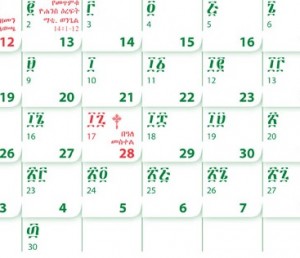 WHY IS ETHIOPIAN CALENDER DIFFERENT FROM GREGORIAN???
WHY IS ETHIOPIAN CALENDER DIFFERENT FROM GREGORIAN???
The current year according to the Ethiopian calendar is 2006, which WILL begin on September 11, 2013 AD of the Gregorian calendar. A SEVEN- TO EIGHT-YEAR GAP between the Ethiopian and Gregorian calendars results from an alternate calculation in determining the date of the Annunciation (the announcement by the angel Gabriel to the Virgin Mary that she would conceive and become the mother of Jesus, the Son of God ) of Jesus.
ANCIENT ETHIOPIAN MONKS BELIEVE D THAT THE ANNUNCIATION OF JESUS CHRIST WAS 7 YEARS BEFORE EUROPEANS (GREGORIAN) STARTRED COUNTING THE YEARS.
The Ethiopian calendar (Amharic: የኢትዮጵያ ዘመን አቆጣጠር yä’Ityoṗṗya zämän aḳoṭaṭär) is the principal calendar used in Ethiopia and also serves as the liturgical calendar for Christians in Eritrea and Ethiopia belonging to the Orthodox Tewahedo churches, Eastern Catholic Church and Lutheran Orthodox Church.
It is a sidereal calendar based on the older Alexandrian or Coptic calendar, which in turn derives from the Egyptian calendar, but like the Julian calendar, it adds a leap day every four years without exception, and begins the year on August 29 or August 30 in the Julian calendar.
Like the Coptic calendar, the Ethiopic or Ge’ez calendar has twelve months of exactly 30 days each plus five or six epagomenal days, which comprise A THIRTEENTH MONTH. The Ethiopian months begin on the same days as those of the Coptic calendar, but their names are in Ge’ez. The sixth epagomenal day is added every four years without exception on August 29 of the Julian calendar, six months before the Julian leap day.
Thus the FIRST DAY OF THE ETHIOPIAN YEAR, 1 MÄSKÄRÄM, for years between 1901 and 2099 (inclusive), IS USUALLY SEPTEMBER 11 (GREGORIAN). It, however, falls on September 12 in years before the Gregorian leap year.
Source: Wiki




























Join Conversations